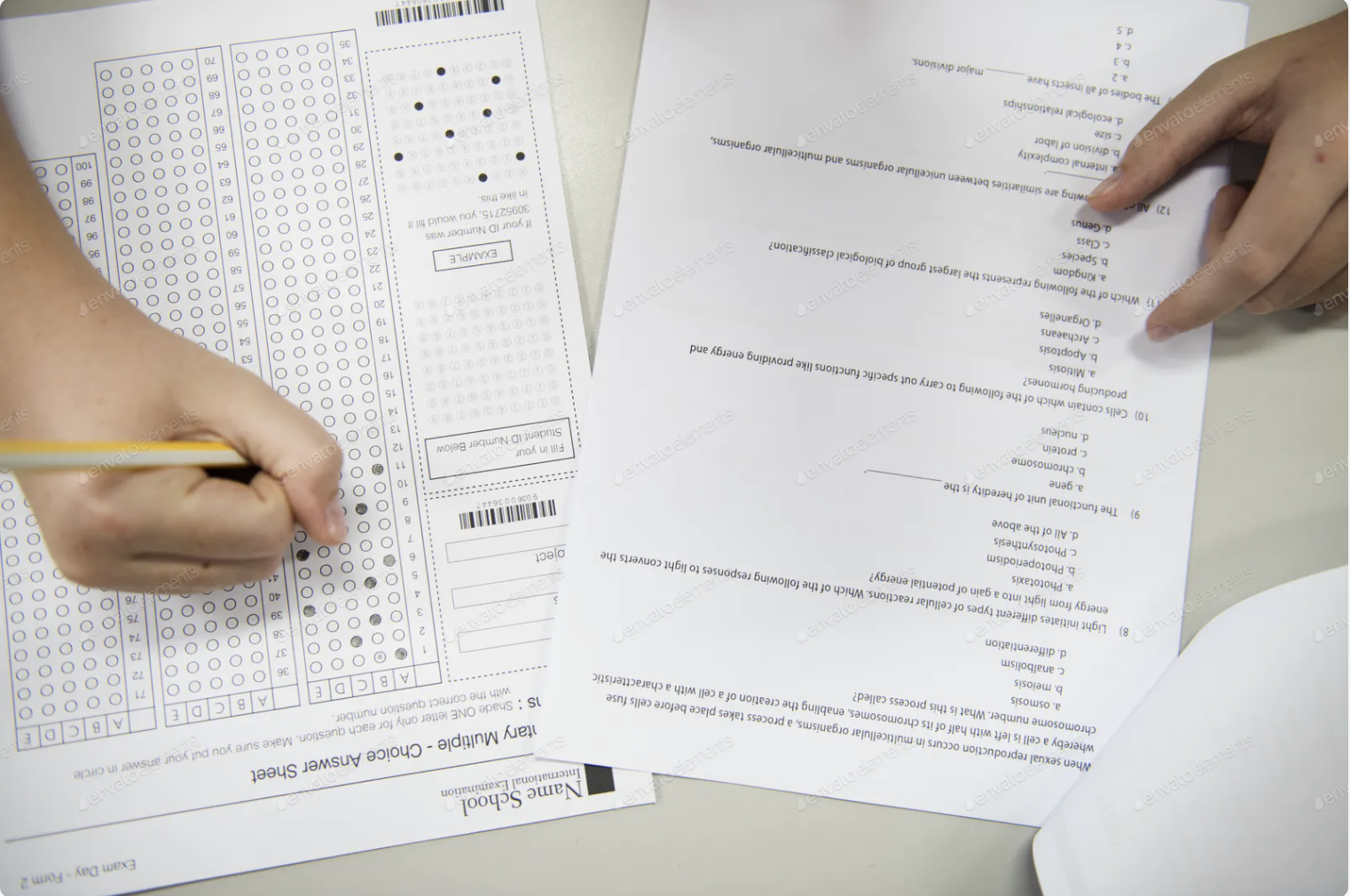IB Biology Paper 2 – best revision tips from the experts

Now the is pressure on, and revision is underway. We thought you would appreciate advice from our IB Biology experts – our IB teachers and IB examiners themselves – with tips on how to help with your IB Biology Revision.
Note – this article relates to the the syllabus with last examinations in 2024.

What to expect from the IB Biology paper 2?
For SL students it only tests knowledge of the core. However, for HL Biology students Paper 2 tests AHL (Additional Higher Level) material as well. Students need to answer questions focusing on objectives
The paper is divided into two sections and the questions address objectives 1, 2 and 3. Here they are as a quick reminder.
- Demonstrate an understanding of Scientific:
- facts and concepts
- methods and techniques
- terminology
- methods of presenting scientific information.
- Apply and use Scientific:
- facts and concepts
- methods and techniques
- terminology to communicate effectively
- appropriate methods to present scientific information.
- Construct, analyse and evaluate:
- hypotheses, research questions, and predictions
- scientific methods and techniques
- scientific explanations.
In section A, there is a data-based question that requires students to analyse a given set of data. The remainder of section A is made up of short-answer questions.
In section B, students at SL are required to answer one question from a choice of three, and students at HL are required to answer two questions from a choice of four. These extended-response questions may involve writing a number of paragraphs, solving a substantial problem, or carrying out a substantial piece of analysis or evaluation. A calculator is required for this paper.
Our 5 Best IB Biology Revision Tips
They have given us their best advice so that you can ace your IB Biology Paper 2 answers. So, here goes…
Tip 1 – Use short, sharp, precise language in Paper 2.
In paper 2, both the short and extended response questions, require some punchy and clearly constructed sentences.
Also, you need to employ a less is more approach. While also making sure you cover everything needed to get full marks on the question.
Pay careful attention to the marks scheme (more on this later).
An examiner summarised this approach neatly by saying, “key things should leap out as you read through the paper.”
As part of your IB Biology revision you need to practise the phrasing and language you use in your answers. Do this by working through past papers. Furthermore, you can also work with a friend to critic your answers and help you improve.
Tip 2 – Understand the command terms…precisely.
The IB Biology exam command terms have subtle but important meanings. But they tell you precisely how to answer the question and the depth of information expected.
Most importantly you need to understand how to correctly understand these terms as part of your IB Biology Revision.
For example, STATE is usually with a one-point question because it requires a one-word answer, with little room for alternative words. So, there is no need for an explanation.
Another term, LIST, is asking for a brief answer, you do not need full sentences. So, any additional time spent crafting a more complicated answer will be wasted.
The term COMPARE, is a true IB biology favourite. It means the examiner needs to see BOTH the similarities AND the differences. Importantly, the answer also needs to refer to ALL the items you need to compare. This could be two or more.
In the Biology guide its definition is precise and is given as: “Give an account of similarities and differences between two (or more) items or situations, referring to both (all) of them throughout.”
So, before you set foot in the exam hall for your IB mock exams, make sure you know the specific meanings of each.
Above all, if you are not sure you know all of them, as your tutor or teacher to share the full list with you.
Or read this article which summarises the meanings.

Book free trial with our certified IB Biology teachers today
100 % of tutors are certified teachers and examiners
Tip 3 – Use your time wisely.
When you answer the questions, it will be under exam conditions, so it is essential to optimise the time you have available.
Don’t write too much!
For example, it is sufficient for a 4 mark question, to write 4 clear but concise sentences, rich with appropriate biological terminology to gain all 4 marks. As long as your meaning is clear to the IB examiner, you do not need to write a whole page essay.
Don’t write too little!
However, don’t fall into the trap of providing too little information. Make sure that each of the 4 points made has a separate, distinct piece of information.
Beware of writing repetitively!
It is also pointless to repeat the same idea multiple times as you will only gain 1 mark for each concept or fact.
So, you can kid yourself into thinking you have covered all 4 points with 4 separate parts of the answer but an examiner could well award much fewer points if it is repetitive.
(Getting familiar with the past paper mark schemes will also help in seeing the exact way in which marks are allocated.)
Tip 4 – During your IB Biology Revision learn the format for data response questions in Paper 2.
A more specific subset of paper 2 questions are the data response questions. They typically follow a recognisable format.
In each case, they ease you in with a simple “STATE” style question that asks you to read a value from a graph or similar graphical representation of data.
As long as you do this within the accepted tolerances (they allow a bit of wiggle room to allow for the vagaries of printed graphs), you will be awarded the point.
Bonus Tip – It is important to pay attention to units too…don’t leave them off the value you state!
The second phase of the question looks at calculating something with the data and will simply ask for an addition, subtraction, mean, or percentage calculation, so make sure you are confident with these concepts.
In the third part, the focus is on spotting trends and being able to say or “DESCRIBE” something quite straightforward.
Such as “when x goes up so does y up until value z where it begins to plateau”. Attention should be paid to the basic patterns or trends, some significant values you can point out, and any obvious anomalies.
The 4th section will typically ask for a comparison of 2 sets of data. Usually, it is sufficient to point out a couple of particular similarities and differences. For example, they both have a value of around x at point y, whereas at a higher value of y the x-values are different and are z and w.
Finally, you will be expected to evaluate the data in some way. This means pointing out some valid advantages (e.g reliability from error bars). Plus, some disadvantages are supported by specific values. Also, add a concluding statement of your opinion based on the values you have highlighted.
The opinion would typically be a comment on the validity, reliability, or testability of the hypothesis or conclusions.

Tip 5 – Play to your strengths.
Once again, pre-read the paper before answering any questions to determine as best you can where you are going to score the most marks.
Then come back to the ones you feel will be a bit more of a challenge later on.
Whether you are taking HL or SL , these tips for IB Biology Paper 2 will help you approach your IB mocks and final IB Biology exams with confidence.
For help in your multiple-choice Paper 1, or to book a lesson with us on any IB Biology topic, HERE.
To see more of our IB Biology teachers, check out our IB Biology page HERE.
In case you want to review the course outline on the IBO site, click HERE.














